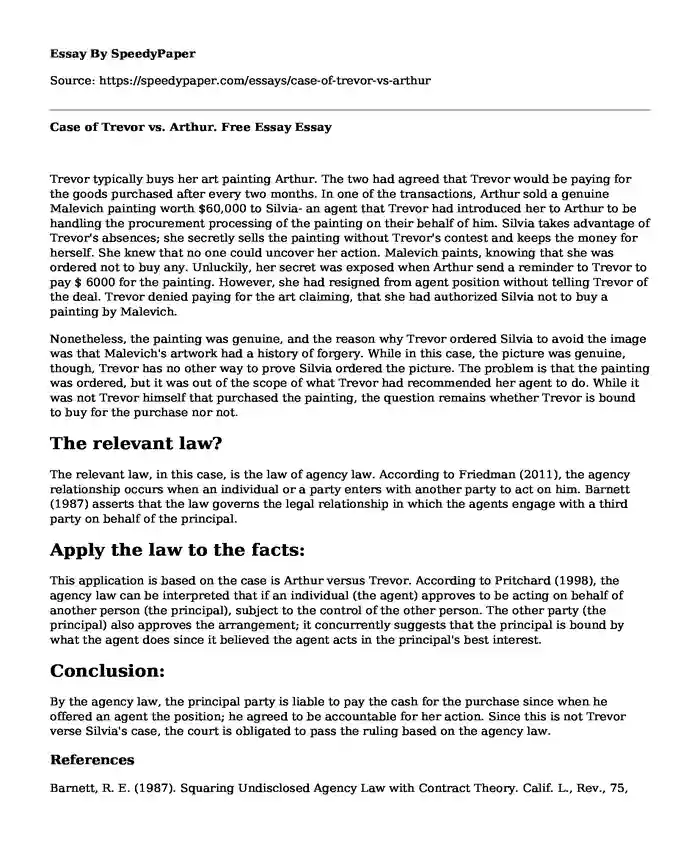
| Type of paper: | Essay |
| Categories: | Law Arts Case study |
| Pages: | 2 |
| Wordcount: | 534 words |
Trevor typically buys her art painting Arthur. The two had agreed that Trevor would be paying for the goods purchased after every two months. In one of the transactions, Arthur sold a genuine Malevich painting worth $60,000 to Silvia- an agent that Trevor had introduced her to Arthur to be handling the procurement processing of the painting on their behalf of him. Silvia takes advantage of Trevor's absences; she secretly sells the painting without Trevor's contest and keeps the money for herself. She knew that no one could uncover her action. Malevich paints, knowing that she was ordered not to buy any. Unluckily, her secret was exposed when Arthur send a reminder to Trevor to pay $ 6000 for the painting. However, she had resigned from agent position without telling Trevor of the deal. Trevor denied paying for the art claiming, that she had authorized Silvia not to buy a painting by Malevich.
Nonetheless, the painting was genuine, and the reason why Trevor ordered Silvia to avoid the image was that Malevich's artwork had a history of forgery. While in this case, the picture was genuine, though, Trevor has no other way to prove Silvia ordered the picture. The problem is that the painting was ordered, but it was out of the scope of what Trevor had recommended her agent to do. While it was not Trevor himself that purchased the painting, the question remains whether Trevor is bound to buy for the purchase nor not.
The relevant law?
The relevant law, in this case, is the law of agency law. According to Friedman (2011), the agency relationship occurs when an individual or a party enters with another party to act on him. Barnett (1987) asserts that the law governs the legal relationship in which the agents engage with a third party on behalf of the principal.
Apply the law to the facts:
This application is based on the case is Arthur versus Trevor. According to Pritchard (1998), the agency law can be interpreted that if an individual (the agent) approves to be acting on behalf of another person (the principal), subject to the control of the other person. The other party (the principal) also approves the arrangement; it concurrently suggests that the principal is bound by what the agent does since it believed the agent acts in the principal's best interest.
Conclusion:
By the agency law, the principal party is liable to pay the cash for the purchase since when he offered an agent the position; he agreed to be accountable for her action. Since this is not Trevor verse Silvia's case, the court is obligated to pass the ruling based on the agency law.
References
Barnett, R. E. (1987). Squaring Undisclosed Agency Law with Contract Theory. Calif. L., Rev., 75, 1969. https://scholarship.law.georgetown.edu/cgi/viewcontent.cgi?article=2559&context=facpub
Friedman, L. M. (2011). Contract law in America: a social and economic case study. Quid Pro Books. https://books.google.co.ke/books?hl=en&lr=&id=hRKw8GqeyLwC&oi
Pritchard, A. C. (1998). United States v. O'Hagan: Agency Law and Justice Powell's Legacy for the Law of Insider Trading. BUL Rev., 78, 13. https://repository.law.umich.edu/cgi/viewcontent.cgi?article=1513&context=articles
Cite this page
Case of Trevor vs. Arthur. Free Essay. (2023, Nov 24). Retrieved from https://speedypaper.com/essays/case-of-trevor-vs-arthur
Request Removal
If you are the original author of this essay and no longer wish to have it published on the SpeedyPaper website, please click below to request its removal:
- Child Welfare or Juvenile Justice? Free Essay Example
- Law Essay Example: Supranational Courts
- Lesson Plan Essay Example
- Art Essay Sample: Gustav Klimt and Edvard Munch
- Paper Example. Knowledge Frame Work
- Report on Harmony and Discord: Exploring Justice, Race, and Humanity in 'Twelve Angry Men and Women'
- Essay Sample on Beatles Social Issue
Popular categories




